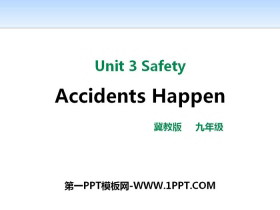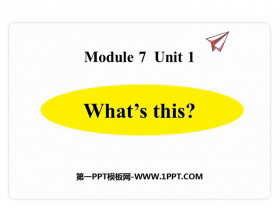





《Earth first》SectionⅠPPT
第一部分内容:教材背景
科学家警告:北极海冰的加速融化会造成不可控制的全球气候变化。
Melting Arctic Sea Ice Could Start
Uncontrollable Global Climate Change
The rapid melting of the Arctic sea ice could be about to bring about catastrophic(灾难性的) events across the world, scientists have warned.
The effects of the melting ice could be felt as far away as the Indian Ocean as the warm weather sets off 19 global tipping points(临界点), according to the new Arctic Resilience Report. Those tipping points happen when a natural system quickly changes, leading to great effects on nearby ecosystems that might never be reversed(彻底转变).
In the Arctic, they include growing vegetation that stops snow and ice and so absorbs more heat, and the release of methane(甲烷) from the Arctic as it warms. The report includes a range of different disastrous events that are likely to be produced by the warming poles.
The findings come just as climate scientists have warned that sea ice in the Arctic appears to be melting far more quickly than expected as the result of high temperatures.
Air over the Polar ice cap has been 9-12 degrees Celsius above average over the last four weeks, according to the Danish Meteorological Institute(DMI).Through last week, temperatures reached melting point, putting them far above the expected temperature and serving as a dangerous signal for the sea ice there.
The temperature is “by far the highest recorded”,DMI researcher Martin Stendel told the AFP.“What we are observing is very unusual.”
At this time of year, the Arctic Ocean would be expected to start freezing up into sea ice again. But it isn’t happening.
“Not only was the ice not growing as it would normally, there was further melting due to warm air coming in,” he told the news agency.
That effect is being caused by a number of factors—not only climate change, but also temporary weather phenomena like El Niño. But those temporary(短暂的) things are being strengthened by climate change, which is the final driver of the melting sea ice, scientists said.
... ... ...
Earth first PPT,第二部分内容:新知感悟
重点单词
阅读词汇 (在不认识的单词前划√)
□shark n. □dive v.
写作词汇
1. ________ v. 把……作为目标
2. ________ n. (尤指通过行为表现出的对某事的一般)看法,态度
拓展词汇
3. ________ adj.使(某人)惊恐,吓唬→scared adj.对……感到惊慌的;吓坏了的
4. __________ adv.幸运地→fortunate adj.幸运的;吉祥→fortune n.幸运;运气
5. __________ n.灭绝,绝种→extinct adj.绝种的;消亡了的
重点短语
1. ________ 恐惧,担心
2.________________ 讲述……的故事
3.____________________________害怕……
4.________________ 由于,因为
5.________________ 切断;阻断;隔绝
6.___________________ 对……有影响
重点句型
1.形容词(短语)作状语:Some people stopped swimming in the sea, ___________________________________________ (由于害怕电影里可怕的生物).
2.was/were doing...when...:In 1980, Benchley ________________ (正在潜水就在这时) he came across an awful sight.
3.部分否定:Fortunately, ________________ (并非每个人) who watched the film Jaws became afraid of sharks—some became interested in understanding them.
... ... ...
Earth first PPT,第三部分内容:语篇理解
Ⅰ Read the text and fill in the blanks.
Before the film Jaws
↓People had a longheld idea that the great white shark is 1.________.
After the film Jaws
↓ People became more 2. ________of sharks.
The number of large sharks fell quickly due to fear of sharks and 3.________.
In 1980
↓Peter Benchley admitted that his book was 4.________about sharks’ behaviour.
Today
↓More people want to 5.________the sharks from extinction.
Ⅱ Read the text carefully and choose the best answer according to the text.
1.What is the writer’s purpose of writing the passage?
A.To recommend the film Jaws and the book to people.
B.To criticize Peter Benchley’s misleading description of sharks.
C.To raise people’s awareness of shark protection.
D.To inform people that sharks are dangerous.
2.According to the passage, which one is WRONG about the film Jaws?
A.A woman died as a result of a shark’s attack.
B.It was popular with huge audiences.
C.It changed people’s longheld idea of shark as a dangerous animal.
D.It won a great reputation in the field of film.
3.Why did the number of large sharks fall quickly?
A.Because of the climate change.
B.Because of people’s killing and finning.
C.Because of lacking of enough food.
D.Because of the pollution of the ocean.
4.Nowadays, what is people’s attitude towards protecting sharks?
A.Neutral.
B.Indifferent.
C.Disapproval.
D.Favorable.
... ... ...
Earth first PPT,第四部分内容:词汇精研
1. scare v.使(某人)惊恐;吓唬 n.恐慌;恐惧
(教材P62)People have always been scared of sharks, but Jaws made things worse.
人们一直都害怕鲨鱼,但《大白鲨》使情况变得更糟。
(1)scare...away/off 把……吓跑
(2)scaring adj. 令人害怕的;吓人的
scared adj. 对……感到惊慌的;吓坏了的
be scared of 害怕……
be scared to do... 害怕做……;不敢做……
①His sudden appearance gave me a scare when I was reading an interesting book.
我正在读一本有趣的书,他的突然出现吓了我一跳。
②Last night the sudden thunder ______ (scare) the children.
昨天晚上,突然的雷声吓着了那些孩子。
③They managed to scare the bear __________ with a torch.
他们设法用火把把熊吓跑了。
④Having made mistakes, he is scared __________ facing his strict teacher.
他犯了错,不敢去面对严厉的老师。
⑤Seeing many cars going up and down the street, the boys were scared __________ (cross) the street.
看到马路上来来往往的车辆,那些男孩子不敢过马路。
2. due to 由于;由……造成;应支付;归功于
(教材P62) This was not only due to fear of sharks, but also finning.
这不仅是因为害怕鲨鱼,而且还因为鲨鱼的鳍。
due adj. 应得的;应付的;预定的
be due to sb. 应付给某人
be due to sb./sth. 归因于某人/某物
be due to do sth. 预定/预期做某事
①The flight was put off due to the heavy fog.
这架班机因大雾停航。
②Any money that is due ________ you will be paid before the end of the month.
欠你的钱将在月底之前全部支付给你。
③The bus was due __________ (arrive) at 5 p.m., but it arrived one hour late due to __________ (hold) up by the heavy fog.
公共汽车预计下午五点钟到达,但由于大雾的阻碍它晚了一个小时。
... ... ...
Earth first PPT,第五部分内容:句型精析
1.形容词(短语)作状语
(教材P62)Some people stopped swimming in the sea, afraid of the horrible creature from the film.
有些人因为害怕电影里可怕的生物而不再在海里游泳。
句中“afraid of the horrible creature from the film”是形容词短语作状语,相当于because some people were afraid of the horrible creature from the film。
形容词(短语)作状语可以表示方式、原因或伴随状况等,可位于句首、句末或句中,常用逗号与句子其他成分隔开。
①Cold and hungry, he stopped working and went home.
因为又冷又饿,他停止工作回家了。
②I was back at home at almost midnight, thirsty and __________ (tire).
快到半夜时我才回到家,又渴又累。
③__________ (obvious), a good habit can help us to speed up to reach our destinations.
很显然,好习惯有助于加速实现我们的目标。
2. was/were doing...when...
(教材P63)In 1980, Benchley was diving when he came across an awful sight.
1980年,本奇利正在潜水,就在这时他突然看到一个可怕的景象。
句中的when是并列连词,意为“就在这/那时”,相当于and then或and at the same time。
when作并列连词时常用于以下句型中:
be doing...when... 正在做……这时……
be about to do...when...=be on the point of doing... when... 正要做……这时……
had just done...when... 刚做了……这时……
①I was thinking of this when I heard my name called.
我正想着这件事,突然听到有人叫我的名字。
②We __________ (do) our homework when the light went out.
我们正在做家庭作业,灯突然熄了。
③We were about __________ (set) out when it began to rain.
=We were on the point of__________ (set) out when it began to rain.
我们正要出发,这时天开始下雨。
④I had just gone to bed after a very hard day __________ the phone rang.
在劳累了一天之后,我刚上床睡觉,这时电话响了。
关键词:外研版高中英语必修二PPT课件免费下载,Earth first PPT下载,.PPT格式;












